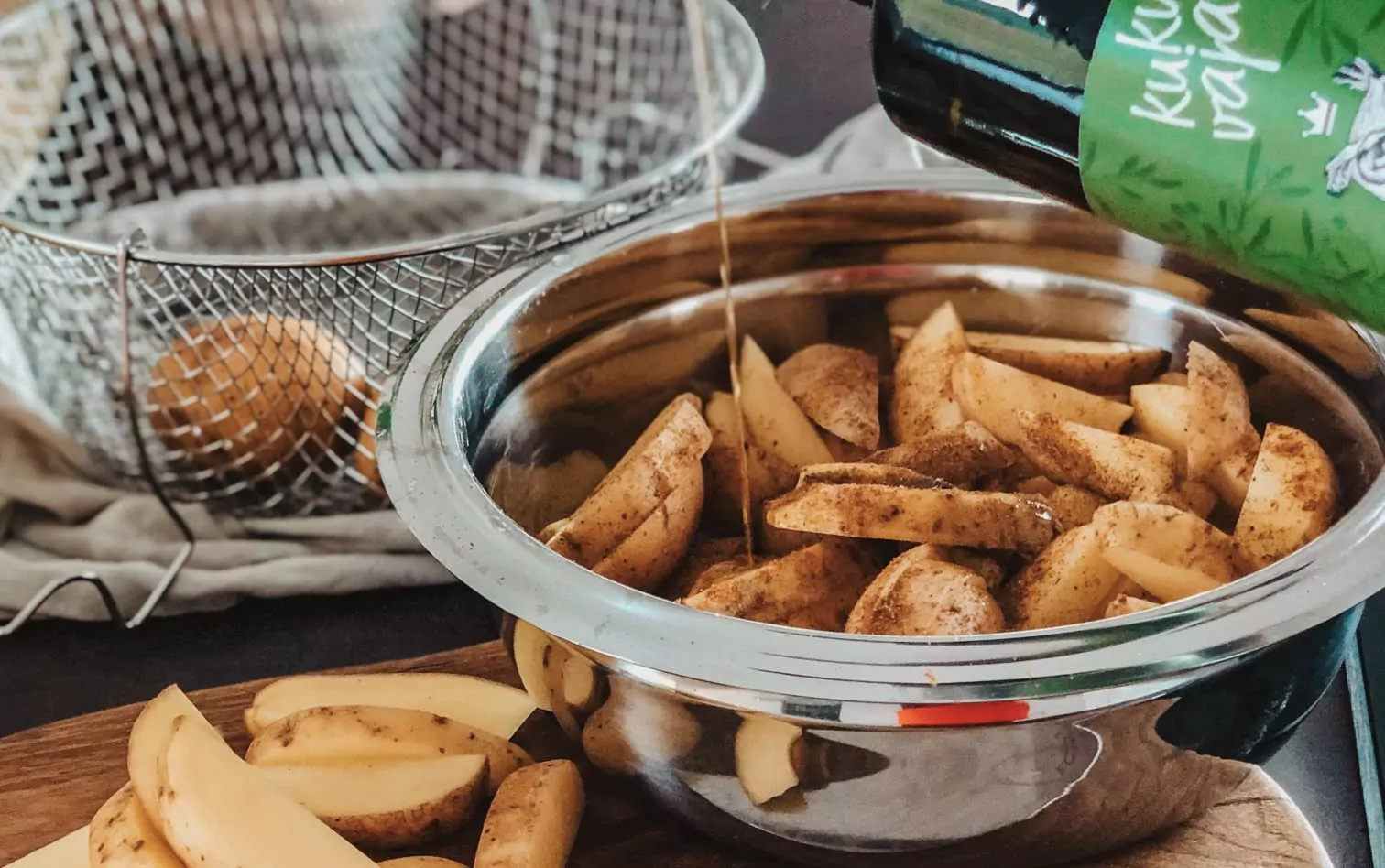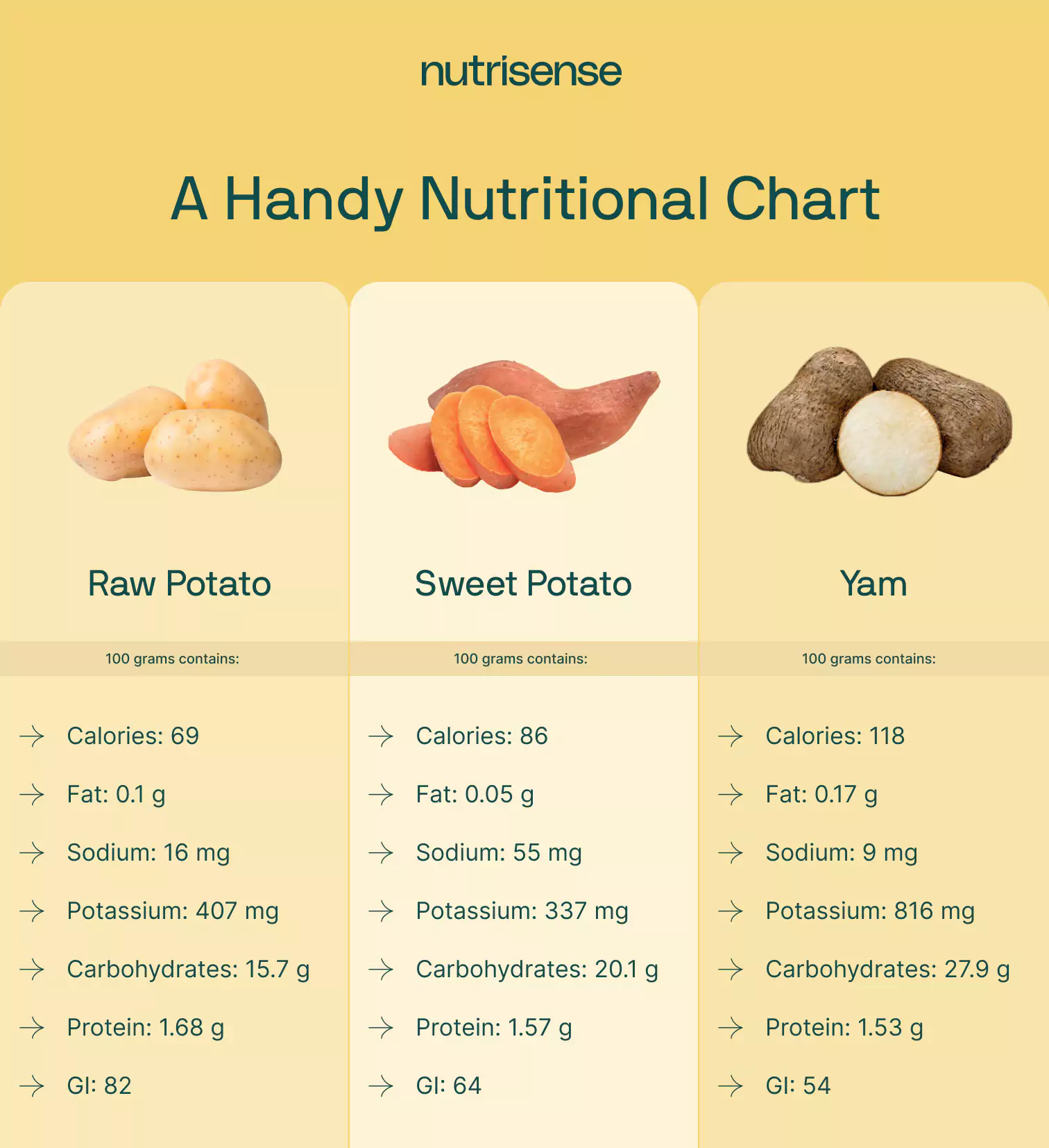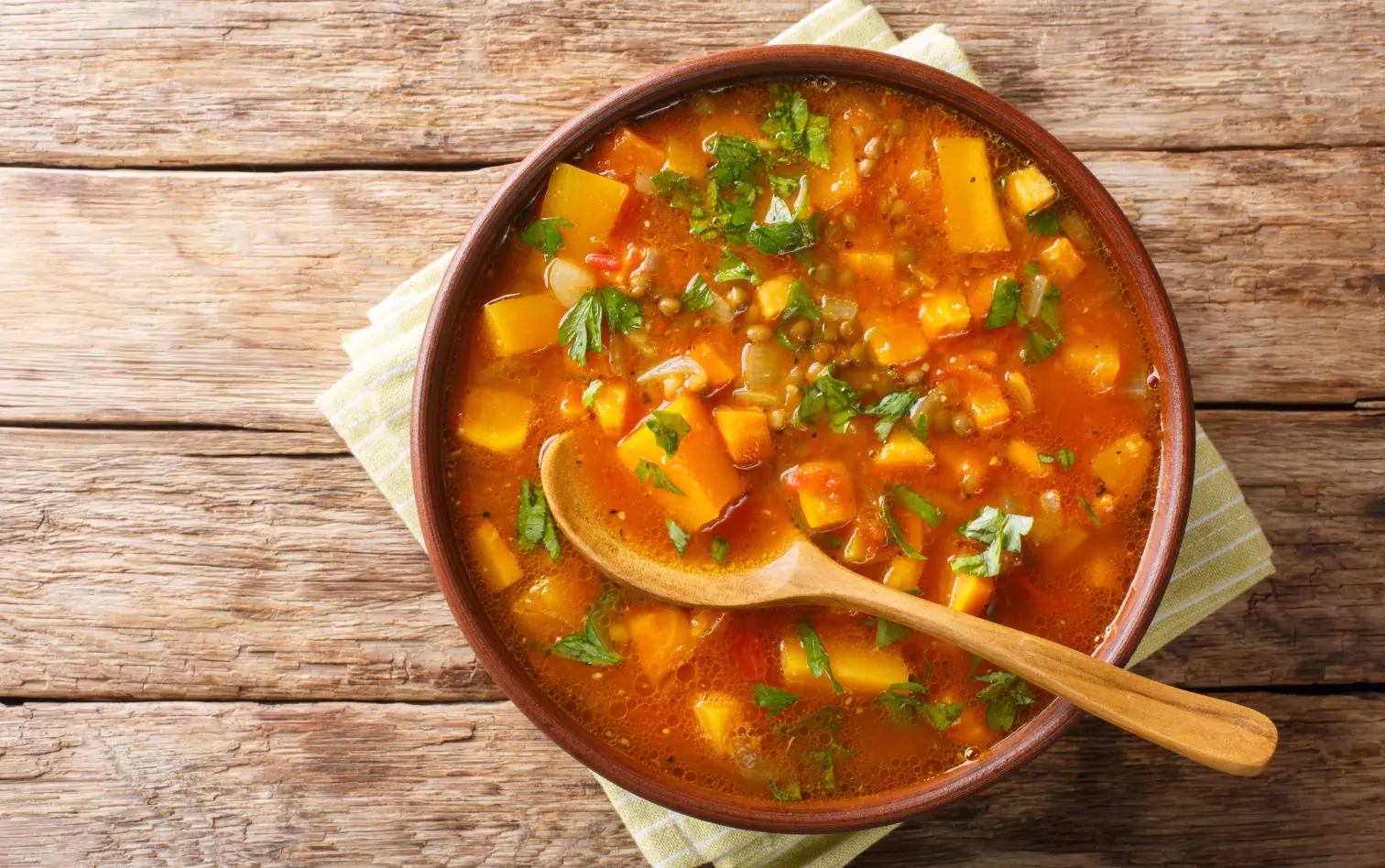Health Benefits of Sweet Potatoes, Potatoes, and Yams

Key Takeaways
What do potatoes, yams, and sweet potatoes have in common? They’re staples in kitchens worldwide, beloved for their versatility and comforting flavors—and they’re winter festive favorites! But are they nutritionally equal, and should you prioritize one over the other for your health?
Though these root vegetables may seem similar, they come from different plant families and offer unique health benefits. Whether you're curious about their impact on blood sugar, weight management, or overall wellness, this guide explains it all!
Are Sweet Potatoes and Yams the Same Vegetable?
Potatoes, yams, and sweet potatoes are not as closely related as you might think:
- Potatoes: Tubers from the nightshade family (Solanaceae) are known for their starchy content and versatility.
- Sweet Potatoes: Root vegetables from the Morning Glory family (Convolvulaceae), famous for their natural sweetness and vibrant orange hue.
- Yams: Tubers from the lily family (Dioscoreaceae), starchy with an earthy flavor, often mistaken for sweet potatoes.
Each has unique properties, nutritional profiles, and health benefits. Let’s explore them in detail.
Did you know
Regular white potatoes are one of the most popularly consumed vegetables in the United States!
Sweet Potatoes

Sweet potatoes (scientifically known as Ipomoea batatas) are a root vegetable from the Morning Glory family. While they are often grouped with potatoes, they are technically not the same. Sweet potatoes—a fall and winter staple for many—are sweeter and typically have brown skin with orange flesh, though there are also white and purple varieties.
A raw sweet potato contains various nutrients and natural sugars, making it a good source of energy and nutrition.
Healthier Preparation Methods

Although sweet potatoes are naturally low in fat, they can often be prepared with high-salt ingredients or fried, making them less healthy. Baked, boiled, or roasted sweet potatoes are among the healthiest methods, but other options like air frying can also be good alternatives.
Nutrient Content and Health Benefits
Sweet potatoes are rich in vitamins, minerals, and antioxidants. The specific nutrient content can vary, but in general, sweet potatoes provide:
- Carotenoids (responsible for their orange color)
- Beta-carotene
- Anthocyanin
- Vitamin C
- Vitamin B6
- Potassium
- Fiber
- Iron
- Magnesium
Sweet potatoes also provide more fiber than regular potatoes, which helps regulate blood sugar and supports digestive health. They also contain resistant starch, although it’s in smaller amounts than potatoes. Cooking and cooling sweet potatoes can increase the resistant starch content.
The Glycemic Index of Sweet Potatoes
Sweet potatoes have a medium glycemic index (GI), typically around 64, lower than regular potatoes. The GI can vary based on what type of cooked sweet potato you’re looking at, but sweet potatoes generally have a moderate impact on blood sugar. For example:
- Purple sweet potatoes have a GI in the medium range, often around 60-70, depending on the exact type and how they’re cooked.
- Orange-fleshed sweet potatoes generally have a GI closer to 60-75, also varying with cooking methods.
Are Sweet Potatoes Bad for You?
No! Although the response will differ based on your unique body, sweet potatoes in moderation typically offer many health benefits:
- Antioxidants: Rich in beta-carotene and anthocyanins, which help protect the body from free radical damage and chronic diseases.
- Digestive Health: The fiber content supports digestion and helps regulate blood sugar.
- Cancer Risk: Some studies suggest that sweet potatoes may help reduce your cancer risk, especially due to their high antioxidant content.
The Type of Sweet Potato Matters
Not all sweet potatoes are created equal. To maximize health benefits:
- Whole Sweet Potatoes: Opt for whole, unprocessed sweet potatoes for the best nutritional value.
- Processed Sweet Potatoes: Sweet potato fries and chips may not be as healthy, especially when fried in oils or added with salt.
Can Sweet Potatoes Help with Weight Management?
Sweet potatoes are a filling, satiety-inducing food that can aid in weight management when eaten in moderation. Their high fiber content helps keep you full longer, and their nutrients provide sustained energy.
Are Sweet Potatoes High in Sugar?
Sweet potatoes contain about five to six grams of natural sugars per medium-sized potato, with most of their carbohydrates being starch. Their moderate glycemic index means they have a slower effect on blood sugar than foods with higher sugar content.
Preparation methods can influence the sugar impact, so enjoying them in their whole, unprocessed form is best. Also, pairing them with good-quality protein is best to keep glucose levels steady. To see how your unique body can benefit from the vegetable, working with a registered dietitian is a good idea.
Potatoes

Potatoes are a versatile and filling vegetable, rich in carbohydrates that provide a good energy source. As a starchy vegetable from the nightshade family, potatoes usually have brown skin and yellow or white flesh, though some varieties, like red and purple potatoes, have different colors.
Interestingly, a raw potato is about 80 percent water and contains a variety of healthy carbohydrates and nutrients!
Healthier Preparation Methods

While potatoes are naturally low in fat, they are often prepared with high-salt ingredients or fried, making them less healthy. Baking potatoes is generally considered the healthiest method, but air frying, boiling, or sautéing can also be good options.
Potatoes are rich in several vitamins, minerals, and antioxidants. The specific nutrient content can vary depending on the variety, but in general, potatoes provide:
- Vitamin C
- Vitamin B6
- Potassium
- Fiber
- Carbohydrates
- Iron
- Phosphorus
- Niacin
- Thiamin
- Riboflavin
Although potatoes are not a high-fiber food, they provide moderate fiber, which can help regulate blood sugar levels and cholesterol. They also contain resistant starch, which has health benefits similar to soluble and insoluble fiber.
The Glycemic Index of Potatoes
Potatoes rank relatively high on the glycemic index (GI), which measures how quickly a food raises blood sugar levels. For example, a red potato has a GI of around 80, while a medium potato has a GI of 82. The GI can vary depending on size and cooking method, typically between 50 and 100.
Are Potatoes Bad for You?
Not necessarily! Potatoes offer several health benefits:
- Potassium: A medium baked potato is an excellent source of potassium, which supports heart health and can help lower blood pressure.
- Antioxidants: Potatoes contain antioxidants that help fight disease.
- Digestive Health: The starch and fiber in potatoes promote healthy digestion.
The Type of Potato Matters
Not all potatoes are equal. To maximize health benefits:
- Whole Potatoes: Choose unprocessed, entire potatoes for the best nutritional value.
- Processed Potatoes: Instant mashed potatoes, French fries, and chips are less healthy.
Can Potatoes Help with Weight Management?
Potatoes are a filling, satiety-inducing food, which may help with weight management when consumed in moderation. Some studies suggest that potatoes may contribute to weight gain in some, but this is typically tied to processed forms, not whole potatoes.
The best way to find out if potatoes are a good option for your specific dietary goals is to work with a personal nutritionist.
Yams

Yams are often confused with sweet potatoes, but they are entirely different vegetables. While sweet potatoes belong to the Morning Glory family, yams are part of the Lily family. Yams have rough, thick skin and a starchy, earthy flavor, whereas sweet potatoes have soft, thin skin and are sweeter.
The Nutrient Content and Health Benefits

Similar, but not the same as sweet potatoes, yams are rich in several vitamins and minerals, including:
Yams contain fiber, which can help with weight management by promoting feelings of fullness. They are also a good source of potassium, which supports heart health and can help lower stroke risk.
They may also have other interesting health benefits, like helping to alleviate menopausal symptoms and their effect on fertility. Some animal studies suggest a link to better glucose metabolism and gut health as its source of vitamin B6 helps with blood sugar control.
Potatoes, Yams, Sweet Potato and Blood Sugar

Potatoes, yams, and sweet potatoes can be part of a healthy diet for most people. However, the best way to see how they affect your body is to look at a key metric—your blood sugar levels.
All three root vegetables are higher in carbohydrates than some other vegetables. So, if not correctly balanced with the rest of your meal or dietary needs, they can cause blood sugar spikes, which can increase your risk of conditions like prediabetes and type 2 diabetes.
It can be helpful to monitor your blood sugar levels with a tool like a CGM to see what foods affect your blood sugar levels. Depending on your unique needs, you can work with a personal glucose expert, like Nutrisense’s registered dietitians and nutritionists.

Nutritionist-Approved Yam, Potato and Sweet Potato Recipes
Wondering how to include these three starchy vegetables in some delicious meals? Here are three recipes we love, with some ingredient swaps and alternative suggestions from our team of glucose-expert dietitians. Experiment, track your responses, and tell us how they worked for you!
Healthy Oven Baked Potatoes From allrecipes

You'll need:
- 1 tablespoon olive oil
- 1 tablespoon minced garlic
- 1 tablespoon chopped fresh basil
- 1 tablespoon chopped fresh rosemary
- 1 tablespoon chopped fresh parsley
- ½ teaspoon red pepper flakes
- ½ teaspoon salt
- 4 large potatoes with skin, peeled and cubed
We love this recipe because it has good quality oils and fresh herbs to flavor the dish. It's also effortless to make! Pair with a side salad and your favorite protein for a complete meal.
Healthy Sweet Potato Casserole from The Modern Proper

For this sweet potato recipe, you'll need:
- 5 large sweet potatoes, peeled and sliced 1/8 inch thick (use a mandolin if you have one!)
- 1/4 cup pumpkin seeds
- 1/4 cup candied ginger
- 1/4 cup craisins (Pro Tip: substitute this for unsweetened dried fruit such as cranberries)
- 1/2 cup pecans, chopped
- 1/4 cup maple syrup (you can also swap for brown sugar instead)
- 1/2 cup coconut oil, melted
- 1 teaspoon cinnamon
- 1/4 teaspoon nutmeg
- 1 teaspoon salt
This recipe is a fantastic twist on the traditional sweet potatoes and marshmallows we traditionally serve during the holidays. It's still sweet but contains healthy, flavorful alternatives to the marshmallow topping. If you want to cut back even more on the sugar content, consider cutting out maple syrup or reducing it by half.
African Yam Stew from Forks Over Knives

You'll need:
- ½ cup water
- 1 onion, chopped
- 1–2 tablespoon(s) Anaheim or jalapeño pepper, minced
- 1 tablespoon ginger, ground
- 1 tablespoon garlic granules
- 2 teaspoons cumin, ground
- 2 teaspoons coriander, ground
- ¼ teaspoon crushed red pepper
- 6 yams, peeled and chopped
- 2 cups vegetable broth
- 24 ounces tomatoes, chopped
- 14 ounces garbanzo beans, drained and rinsed
- 14 ounces black-eyed peas, drained and rinsed
- ½ cup almond or peanut butter, unsweetened
- 1½ cup corn
- 6 cups collards, chopped
We love this nutrient-packed, filling meal. This recipe contains many nutrient-packed foods, making it great for your immune system—plus, it’s great comfort food for the season!
Find the right Nutrisense programto turn insight into progress.
Learn How Your Body Responds to Food with Nutrisense
Curious about how these root vegetables impact your unique health goals? Whether managing your blood sugar, exploring weight management strategies, or simply aiming to optimize your overall wellness, knowing how your body reacts to specific foods is a good way to get the most out of your diet. A registered dietitian from Nutrisense can guide you every step of the way. It’s also good to track and experiment with your meals and use tools like a continuous glucose monitor.
With personalized insights and expert advice, you can confidently incorporate potatoes, yams, and sweet potatoes into a balanced diet tailored to your needs. Ready to take the guesswork out of your diet and lifestyle habits? Sign up for Nutrisense today to unlock the potential of personalized health!
Go Beyond Glucose Data with Nutrisense
Your glucose can significantly impact how your body feels and functions. That’s why stable levels are an important factor in supporting overall wellbeing. But viewing glucose isn't enough. Nutrisense, you’ll be able to learn how to use your body's data to make informed lifestyle choices that support healthy living.
One-to-one coaching
Sign up to access insurance-covered video calls to work with a glucose expert: a personal registered dietitian or certified nutritionist who will help tailor your lifestyle and diet to your goals.
Monitor and measure what matters
With the Nutrisense CGM Program, you can monitor your glucose with health tech like glucose biosensors and continuous glucose monitor (CGM)s, and analyze the trends over time with the Nutrisense App. This will help you make the most informed choices about the foods you consume and their impact on your health.
Find your best fit
Ready to take the first step? Start with our quiz to find the right Nutrisense program to help you take control.

Amanda is a Nutrition Manager and Registered Dietitian, with a Masters in Dietetics from Stephen F. Austin State University. Originally from south GA, she got her undergrad degree from Texas Tech University. She worked at a hospital in Fort Worth, TX, for 4 years as a dietitian, counseling those living with HIV.




